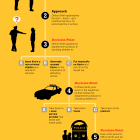Addicted to the Street Life
|
I was born on April 5, 1977 in Harbor City, California. I am 35 and I have been incarcerated since the age of 16. I was tried as an adult and sentenced to 15 years to life for second-degree murder and two attempted murders.







